UK Customs ‘fragmented and disjointed’
By Liz Stephens
The activities and management of Her Majesty’s Revenue and Customs (HMRC) service were criticised in a report released today by an influential body of MPs.
The committee of public accounts called the departments’ management “poor” and referred to its accountability as “blurred”.
Chairman of the committee, Edward Leigh, said: “This situation has been made even more complicated by the involvement since April 2008 of the UK Border Agency.


“HMRC and the UK Border Agency have lacked robust processes to identify new and emerging risks. This is a weakness that both bodies must address in a concerted way.”
HMRC is responsible for enforcing import controls, duty and tax and for enforcing border controls against the smuggling of banned goods such as drugs and guns.
The report criticised the department for a low rate of checking consignments at the UK border. According to the report only two to three per cent are physically checked, which “compares unfavourably with the EU average of nine per cent”.
Mr Leigh said: “HMRC has tried to speed up the process of clearing imports at ports by shifting the emphasis from physical examinations to documentary checks and audits of traders. In practice this has led to an erosion of control.”
He added: “Detected non-compliance is increasing.”
Ninety-nine per cent of declarations are submitted electronically in a relatively straightforward process.
However, customs rules are set by the EU and are extremely complex, leaving traders confused as to how to comply and which categories to classify their goods under.
A UK Border Agency spokesperson said: “Many of the issues identified by the report and highlighted by the PAC have already been addressed.
“A new HMRC organisational structure has been implemented which improves accountability.
“As the PAC acknowledge, comparisons of examination levels with other EU countries is not helpful. The type and range of checks on freight by Customs authorities differ widely.”
In 2007-08, HMRC processed some 22 million import declarations, accounting for over £186 billion of goods imported from outside the European Union (EU).

